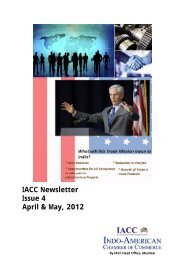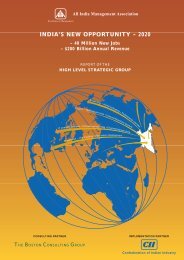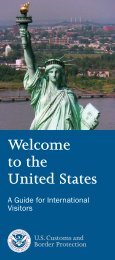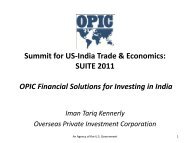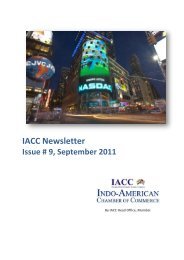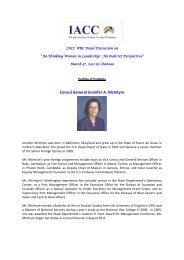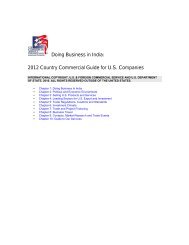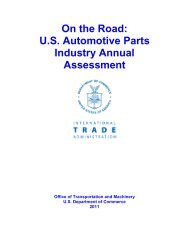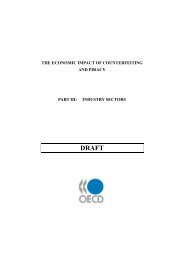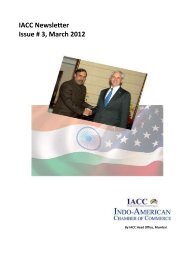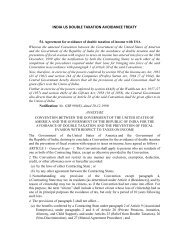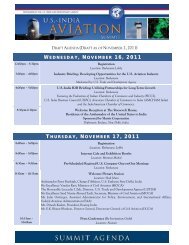Importing into the United States - Indo-American Chamber Of ...
Importing into the United States - Indo-American Chamber Of ...
Importing into the United States - Indo-American Chamber Of ...
You also want an ePaper? Increase the reach of your titles
YUMPU automatically turns print PDFs into web optimized ePapers that Google loves.
RULES OF ORIGIN<br />
For commercial shipments requiring<br />
formal entry, a claim for preferential tariff treatment<br />
under ATPA is made by showing that <strong>the</strong><br />
country of origin is a designated beneficiary<br />
country and by using <strong>the</strong> letter “J” as a prefix<br />
to <strong>the</strong> appropriate tariff schedule number on<br />
Customs Form 7501. Merchandise will be eligible<br />
for ATPA duty-free treatment only if <strong>the</strong><br />
following conditions are met:<br />
■<br />
■<br />
The merchandise must have been produced<br />
in a beneficiary country. This<br />
requirement is satisfied when: (1) <strong>the</strong><br />
goods are wholly <strong>the</strong> growth, product, or<br />
manufacture of a beneficiary country, or<br />
(2) <strong>the</strong> goods have been substantially<br />
transformed <strong>into</strong> a new or different article<br />
of commerce in a beneficiary country.<br />
The merchandise must be imported<br />
directly from any beneficiary country <strong>into</strong><br />
<strong>the</strong> customs territory of <strong>the</strong> <strong>United</strong> <strong>States</strong>.<br />
■ At least 35 percent of <strong>the</strong> article’s<br />
appraised value must consist of <strong>the</strong> cost or<br />
value of materials produced in one or<br />
more ATPA or CBI beneficiary countries<br />
and/or <strong>the</strong> direct costs of processing operations<br />
performed in one or more ATPA or<br />
CBI beneficiary countries. The Commonwealth<br />
of Puerto Rico and <strong>the</strong> U.S. Virgin<br />
Islands are defined as beneficiary countries<br />
for purposes of this requirement;<br />
<strong>the</strong>refore, value attributable to Puerto Rico<br />
or to <strong>the</strong> Virgin Islands may also be<br />
counted. In addition, <strong>the</strong> cost or value of<br />
materials produced in <strong>the</strong> customs territory<br />
of <strong>the</strong> <strong>United</strong> <strong>States</strong> (o<strong>the</strong>r than<br />
Puerto Rico) may be counted toward <strong>the</strong><br />
35 percent value-added requirement, but<br />
only to a maximum of 15 percent of <strong>the</strong><br />
appraised value of <strong>the</strong> imported article.<br />
The cost or value of materials imported<br />
<strong>into</strong> ATPA or CBI beneficiary countries from<br />
nonbeneficiary countries may be included in<br />
calculating <strong>the</strong> 35 percent value-added requirement<br />
for an eligible article if <strong>the</strong> materials are<br />
first substantially transformed <strong>into</strong> new or different<br />
articles of commerce and are <strong>the</strong>n used<br />
as constituent materials in <strong>the</strong> production of<br />
<strong>the</strong> eligible article. The phrase “direct costs of<br />
processing operations” includes costs directly<br />
incurred or reasonably allocated to <strong>the</strong> production<br />
of <strong>the</strong> article, such as <strong>the</strong> cost of actual<br />
labor, dies, molds, tooling, depreciation of<br />
machinery, research and development, inspection,<br />
and testing. Business overhead, administrative<br />
expenses and profit, as well as general<br />
business expenses such as casualty and liability<br />
insurance, advertising, and salespeople’s<br />
salaries, are not considered direct costs of processing<br />
operations.<br />
CBI II SECTION 215 AND 222<br />
In addition to <strong>the</strong> origin rules enumerated<br />
above, <strong>the</strong> Customs and Trade Act of 1990<br />
added new criteria for duty-free eligibility<br />
under <strong>the</strong> Caribbean Basin Initiative. First, articles<br />
which are <strong>the</strong> growth, product or manufacture<br />
of Puerto Rico and which subsequently are<br />
processed in a CBI beneficiary country may<br />
also receive duty-free treatment when entered,<br />
if <strong>the</strong> three following conditions are met:<br />
■<br />
■<br />
They are imported directly from a beneficiary<br />
country <strong>into</strong> <strong>the</strong> customs territory of<br />
<strong>the</strong> <strong>United</strong> <strong>States</strong>.<br />
They are advanced in value or improved<br />
in condition by any means in a beneficiary<br />
country.<br />
■ Any materials added to <strong>the</strong> article in a<br />
beneficiary country must be a product of a<br />
beneficiary country or <strong>the</strong> U.S.<br />
Second, articles that are assembled or<br />
processed in whole from U.S. components or<br />
ingredients (o<strong>the</strong>r than water) in a beneficiary<br />
country may be entered free of duty. Duty-free<br />
treatment will apply if <strong>the</strong> components or<br />
ingredients are exported directly to <strong>the</strong> beneficiary<br />
country and <strong>the</strong> finished article is<br />
imported directly <strong>into</strong> <strong>the</strong> customs territory of<br />
<strong>the</strong> <strong>United</strong> <strong>States</strong>.<br />
If advance tariff classification information<br />
is needed to ascertain whe<strong>the</strong>r your merchandise<br />
would be eligible for CBI duty-free treatment,<br />
you may obtain this information under<br />
<strong>the</strong> procedures previously discussed in Chapter<br />
13 relating to dutiable status.<br />
IMPORTING INTO THE UNITED STATES<br />
39



